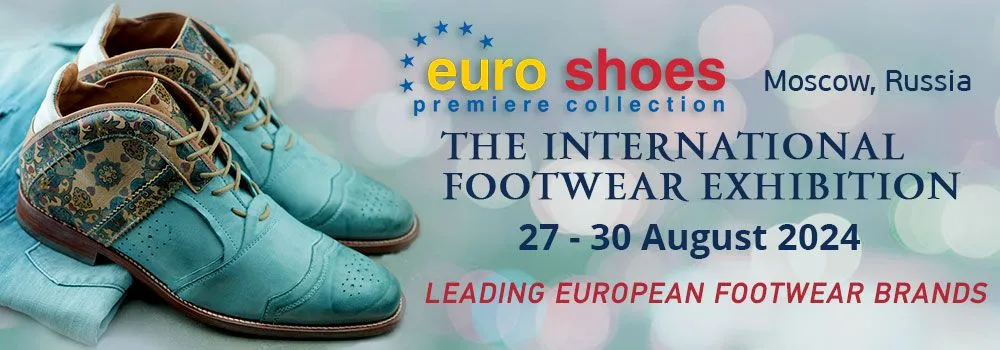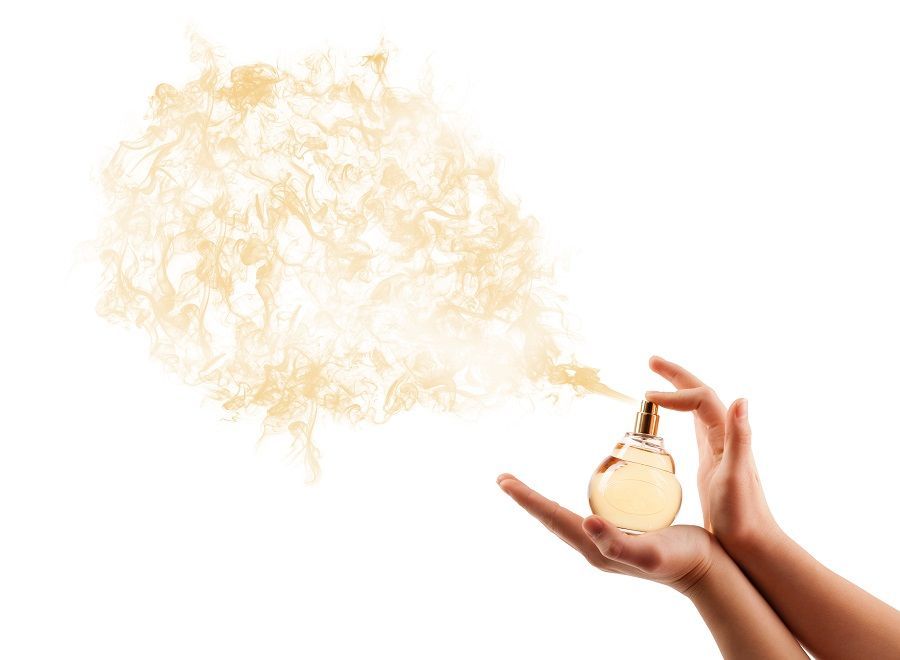
Touch marketing mod or real sales tool

Sensory marketing, or otherwise - neuromarketing, which is based on the impact on a person's feelings at the subconscious level, is becoming an increasingly popular tool in modern marketing, when many simpler, straightforward methods cease to act on the consumer. The three main varieties of sensory marketing - visual, audio and scent - are increasingly being introduced in retail.
We perceive the world through our senses: according to Scent Australia 75,% of emotions come from smells. We say “the smell of childhood”, “the smell of wealth”, “the smell of the New Year” ... Even language supports our emotional and mental “dependence” on smells. Not surprisingly, sensory marketing is becoming an obvious component of successful sales.
Neophyte practice
Aromamarketing is based on the phenomenon of the emotional “anchor”. The smell makes the buyer feel positive emotions in relation to the brand, product, service, contrary to the rational beginning, relying only on feelings. Remember the chain of clothing, footwear and accessories stores of the well-known Spanish brand of the middle price category: anywhere in the world you will find chain stores literally “by smell”! So much he is recognizable. The situation is similar with sound associations, so studies show that a woman, for example, can literally be pushed from the store by the clatter of her heels, which sounds in the trading floor.
The forum “Russian Marketing Week 2014” named the five most effective marketing tools, which included aromatherapy (along with wi-fi marketing, co-branding, audio identity and hardware control methods).
But, despite the growing popularity of neuromarketing, many business owners make two important mistakes that nullify all the potential benefits of using this sales management tool.
The marketing task of a retail company is threefold and consists in attracting a buyer, involving him in the process of choosing a product and purchasing, as well as retaining a customer. As with any marketing tool, sensory marketing only "works" in the hands of experienced professionals. Therefore, the involvement of an expert company for such a seemingly simple action as choosing music or scent for your shopping center is a necessary and indispensable condition in order to get a result. But even here you need to follow certain rules of the game. After all, it often happens that shop owners try to impose on specialists their ideas about what, in their opinion, their product smells like (furniture, shoes, clothes, services ...). And direct associations are not only inappropriate here, but can also lead to the opposite result.
Even worse, if the owner of the store leaves a choice, for example, music at the discretion of the staff of the outlet. Favorite melodies of sellers (chanson or youthful energetic rhythms) can serve as an instrument of rejection rather than involvement of the buyer, as well as sharp announcements on the service radio from the series “Administrator Tatyana Sidorova urgently asked to go to the checkout!”.
Another big mistake is low or too straightforward expectations of the result. Someone considers neuromarketing (in any of its varieties - from aroma to sound or visual) to be a fashionable "chip" and does not expect any real results, even paying for the service, just wants to keep up with the times. Although, of course, there are companies for which scent marketing is part of their image. As Ruslan Yuldashev, director and co-owner of AROMACO, said at the marketing forum, Mercedes Benz, for example, has a so-called PPI (premium perception index) - 70 sheets, roughly - this is an instruction to car dealers on how to create an impression of the salon at a premium level. The smell in the salons of this brand must meet the following criteria: "luxury, privilege, uniqueness, respectability." And recently the brand has released sedans with an aroma spray in the “glove compartment”: each car has its own scent that is selected for you. The chain of Moscow expensive restaurants of the Restaurant Syndicate holding also uses aroma marketing to create its image. Moreover, the aromas used demonstrate luxury and respectability, but not the “product” specifics of the firm's work. In this case, scent marketing works for the image. And as you know, in the luxury segment, like nowhere else, the buyer is ready to pay not only for a product or service, but also for pleasure, for an image.
However, many owners, for example, chain retail, are ready to see sensory marketing as a really working tool, but would like to receive exact numbers of changes in sales - “here and now”. Can scent marketing, for example, have a noticeable effect on increasing sales (increasing sales is the main task of any marketing, in the bottom line) and, if so, how and at what stage you can get evidence of such performance.
.jpg)
What are the expectations?
The problem is that the numbers for companies that provide sensory marketing services and for retailers themselves often differ widely. If marketers sometimes call figures from 40 to 80% of sales growth due to the right aromas and music, then the owners of shops, cafes, and salons speak of more modest 5-10%, while making a footnote for an integrated approach. Who will allow themselves to limit themselves to one marketing tool, having canceled such “good old” tricks, such as gift marketing, promotions, etc.
And yet, studies that bring us closer to true, not far-fetched figures are regularly conducted. And in particular, the use of scent marketing in chain retail can increase the number of visitors by an average of 38% (according to BTL and trade marketing agency Activity Group and Aromaco). As Alexei Batylin, founder and head of Activity Group, emphasized in his speech during the Russian Marketing Week 2014 forum, it is really difficult to calculate the percentage of effectiveness of scent marketing. But it is possible.
From the use of sensory marketing (in particular, aroma), the retail owner is really entitled to expect both "instant" and long-term results. Properly selected flavors of various areas of the shopping center can:
- increase the visitor’s stay in the store (Business Voice research shows an increase of 40%, and an experiment conducted by AROMACO in the Eldorado network - an increase of 31,2%)
- increase the number of impulse purchasesmade by the visitor, in particular - related products, and therefore increase the average bill
- increase traffic inside the store.
But neuromarketing also works for the future: pleasant (on a subconscious level) music or aroma forms a positive image of the brand (store) for the buyer, increases the level of trust in the brand, which means that it works to retain the client, makes him come back and spend money again. this store. All of this ultimately leads to increased income. In addition, as shown by research by Scent Australia, the customer subconsciously considers a product that has a pleasant smell for him as a product of higher quality, and stores (cafes, salons) with a pleasant aroma remember better than those where there was no “aroma”. technology".
Victories and mistakes
According to statistics, in the USA aroma marketing is used in 65% of business premises, in Europe this indicator is by 20% lower, and in Russia this direction takes only the first steps (2%). However, the experience gained by foreign companies providing aroma marketing services cannot be automatically applied on the Russian market. The aromatic associations of our customers can be completely unexpected for Western perfumers. When choosing a fragrance, it is necessary to take into account many factors, among which are the social level of the buyer, his mentality, and the rules of aromatology (aroma science).
One of the myths of scent marketing is that it sells "directly", Yuldashev said. This is not entirely true. For example, there is a group of aggressive smells that can attract people, thus automatically increasing store traffic. But at the same time, the same fragrances may not help to increase sales, since they are not able to retain a buyer or give a subconscious signal to buy. Or soft, comfortable music can keep a customer in the store, but also not push them to make a purchase. But even experienced professionals have "holes". Ruslan Yuldashev told how their company, when selecting fragrances for a cinema (family, mostly, a leisure center) was guided by the consumer's perception of the aroma of cucumber, generally recognized by Western experts. It is believed (and the experience of other countries confirms this) that this fragrance creates a feeling of coziness, comfort, security, family rest. But it turned out that in our country this aroma is associated with the smell of cucumber lotion. Another mistake Yuldashev told about was made by Procter & Gamble, launching cleaning products on the Russian market. All over the world, these products were sold perfectly, we did not sell them at all. It turned out that our consumer subconsciously believes that only that product is capable of cleaning, which smells not of pine needles or fresh apples, or citrus, but ... chlorine. And only by adding this fragrance to its products, the company received successful sales results.
.jpg)
Opinion of professionals
According to the Shoes Report, most shoe retailers believe in the power of aroma and sound marketing, but only a little more than half use it in practice. We talked about sensory marketing and its implementation experience in networks with volume managers of leading companies.
Irina ZUEVA, Marketing Director of the women's shoe chain "ECONIKA":
“We believe sensory marketing elements must be present in the store to help create a unique atmosphere and emphasize brand identity. Our network had experience in using aroma machines for marketing purposes. In addition to the special scent, Econika salons also featured branded music, sweets and chocolate. In 2007, together with the Aromamedia company, we installed 40 special aroma machines in our salons, which were a body with a cartridge inside and a special regulator of aroma intensity. The scent innovation is a natural continuation of a large-scale rebranding program that our company has been running for several years. Describing the scent in words is a difficult task, but then the aroma of the Econika chain was an exquisite composition with notes of orange, lime, watermelon, accompanied by bergamot, thyme and wormwood, and the head part of the aroma consisted of juicy peach, mango and papaya. This lively fragrance became a beautiful addition to shoe stores, where it was pleasant to look through the catalog in a stylish and cozy atmosphere and choose a fashionable, beautiful and comfortable pair of shoes. Then this experiment was recognized as successful, but it ran into a number of everyday problems, namely: the smell could suit the client, and sometimes it could cause a negative reaction, getting used to a certain aroma made you want to change it to something new, but choose a new unique scent, which would have liked many, it was difficult. An important factor then for us was the cost of servicing such machines, the network grew to 150 salons, and accordingly it was necessary to increase costs. Therefore, the project was frozen. Now branded music remains on the network, since it plays a very important background role in the selection and purchase, creates a certain mood in the store, and videos where we show both branded videos on new collections and videos from fashion shows. We select all content very carefully, taking into account the latest fashion trends and company values. When choosing a store today, a buyer is guided not only by the product, price or special promotion offered by the brand, but also by the atmosphere created in the salon, by the elements of care that the company shows towards him, by those interactive communication tools, which she uses to engage the client in the life of the brand. And it is in this field that competition will unfold in the near future. Therefore, we believe that using sensory marketing in work is not self-indulgence, but an effective tool that affects the increase in brand awareness, helps to stand out from competitors and, taking into account the growing demands and preferences of buyers, helps to create a unique shopping experience. And right now we are working on new unique services for buyers. "
Arkady REZNIK, Brand Manager, Carlo Pazolini:
“Carlo Pazolini's boutiques have both scent and sound marketing. There are many studies around the world on the perception of smells by the audience. Certain smells raise the mood, certain ones - they increase the time spent in the trading floor ... In this matter, we are not supporters of a scientific approach. It is much more important, in our opinion, to find your own scent, intuitively perceived in unison with the Brand. Scent marketing has been launched in almost all of our stores in England, Italy and the USA. In Russia, the launch is planned for January 2015. The fragrance is a floral-woody composition with notes of bergamot and sandalwood. The perfumer who created the brand's fragrance is named Christophe Laudamiel, he is the author of many fragrances for famous brands. The musical design of Carlo Pazolini boutiques consists of lounge, instrumental, house, funky-house, soulful compilations. When choosing a company for cooperation on audio content, we were guided, first of all, by the position of accurately broadcasting the mood of Carlo Pazolini and the desire to be on the same wavelength with the visitor. At the heart of creating your own image and forming a brand image in the minds of buyers, there are several main points: brand smell, audio marketing, tactile marketing, interior design. These are the components of the so-called sense-marketing, which affect 5 basic types of human feelings. A brand starts with an Idea. The idea, the essence of the philosophy, spirit, values of the company, is reflected in the product, approaches, attitude towards its customers, design and much more. When we talk about sensory marketing in this vein, we understand additional powerful reflections of the Brand's core message. The company's store should fully be the center, the place where these reflections come together. The more successfully we use sensory marketing, the more the visitor is imbued with the Idea of the Brand, his image, understands his lifestyle and is drawn into the world. Into the world of Carlo Pazolini. "
Sixth sense
Sensory marketing is used by such "monsters" as Jimmy Choo, Bloomingdale's, Goodwill. Jennifer Dublino, VP of Development at ScentWorld Events, LLC, offers an overview of the most popular directions in complex neuromarketing.
- light and color.
According to the National Association of Lighting Manufacturers in Spain (ANFALUM), warm light improves the appearance of leather products, and cold lighting is preferred when selling jeans and suits. Experts advise to adhere to the 80-20 rule. Neutral colors should occupy 80% of your store’s space, and color accents should occupy 20%. - smell.
The most underrated and most powerful of all five senses is the sense of smell. It is the only one directly connected with our lymphatic system and affects emotions, memory, moods. According to the Allsense Group international corporation, a buyer is ready to pay 10-15% more for the same product in a pleasantly smelling room (compared to a “odorless” store). It is traditionally believed that the smell of citruses causes a person to feel happy, lavender and green tea - soothe, vanilla and ambergris create a feeling of reliability and comfort, and floral smells - a symbol of romance or adventurism. - touch.
Studies have shown that by touching a product, the buyer is already able to mentally imagine how he possesses this product. Therefore, experts advise retail owners to use wood, not metal or plastic for display cases with their goods. Wooden tables push the buyer to touch the goods, contribute to the desire to buy. - music.
The rhythm and melody affect how quickly and how the buyer moves around your store, as well as how long he stays in it. Music also affects the mood, which means that it can be “tied” to your store or product or pushed away from it.
Aroma Marketing Directions
Aroma branding - Creation of the planned associative connection of a certain flavor with a specific brand.
Aromadesign - professional selection of aroma with the analysis of all the features, specifics, tasks and goals of the retailer.
Aromaclining - neutralization of unpleasant odors (as a rule, it is used in the area of large fitting shops).
Seasonal Flavoring - aromatization of a shopping facility for a certain period (especially in demand during promotions, holidays, etc.)
This article was published in the 119 issue of the print version of the magazine.
| Please rate the article |
Materials on the topic

Coach turned to Big Data analysis and won the interest of a young audience
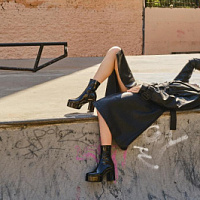
Working with an active audience on Telegram and VKontakte. Mistakes brands make when moving to new local social networks

Why do we need customer reviews?

How to work in VKontakte and Telegram
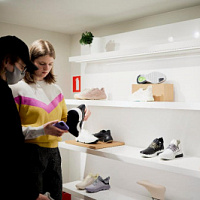
WhatsApp and Telegram: Business Opportunities
Popular
 Louis Vuitton opens a new factory in Italy
Louis Vuitton has opened its second shoe factory in Italy. After opening the first one in Fiesso d'Artico in Veneto, the LVMH flagship brand has just opened a new production site dedicated to this category of footwear in the industrial zone of Civitano in the Marche region. There is also another brand production facility in Tuscany, where bags and leather accessories are produced, writes fr.fashionnetwork.com.
Louis Vuitton opens a new factory in Italy
Louis Vuitton has opened its second shoe factory in Italy. After opening the first one in Fiesso d'Artico in Veneto, the LVMH flagship brand has just opened a new production site dedicated to this category of footwear in the industrial zone of Civitano in the Marche region. There is also another brand production facility in Tuscany, where bags and leather accessories are produced, writes fr.fashionnetwork.com.
 American buyers couldn't buy Birkin bags and sued Hermès
French fashion house Hermès is facing a lawsuit in California from two customers who were unable to purchase exclusive Birkin bags. The fashion house is accused of unfair commercial practices.
American buyers couldn't buy Birkin bags and sued Hermès
French fashion house Hermès is facing a lawsuit in California from two customers who were unable to purchase exclusive Birkin bags. The fashion house is accused of unfair commercial practices.
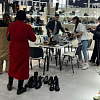 The Euro Shoes @ CAF exhibition was successfully held in Almaty
The Euro Shoes @ CAF exhibition was successfully held in Almaty. From March 11 to 13, the international exhibition of clothing, footwear and accessories Euro Shoes @ CAF was held in Almaty with great success.
The Euro Shoes @ CAF exhibition was successfully held in Almaty
The Euro Shoes @ CAF exhibition was successfully held in Almaty. From March 11 to 13, the international exhibition of clothing, footwear and accessories Euro Shoes @ CAF was held in Almaty with great success.  We are ready for active development in the Russian market
Friedrich Naumann, CEO of the Tamaris brand, told Shoes Report about the company’s ambitious plans, business development in Russia and expansion of the retail network, and also shared details about new collections and launches.
We are ready for active development in the Russian market
Friedrich Naumann, CEO of the Tamaris brand, told Shoes Report about the company’s ambitious plans, business development in Russia and expansion of the retail network, and also shared details about new collections and launches.
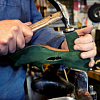 “Discount for repairs” of clothes and shoes in France supported workshops
The French have calculated the benefits of a program that encourages consumers to repair clothes and shoes by providing discounts on these services in certified workshops. The “repair discount” program began operating in France in November last year. Over the six months of operation of this program, the number of calls to repair shops in France increased 10 times and amounted to 250 repairs. The French saved 000 million euros, writes leparisien.fr.
“Discount for repairs” of clothes and shoes in France supported workshops
The French have calculated the benefits of a program that encourages consumers to repair clothes and shoes by providing discounts on these services in certified workshops. The “repair discount” program began operating in France in November last year. Over the six months of operation of this program, the number of calls to repair shops in France increased 10 times and amounted to 250 repairs. The French saved 000 million euros, writes leparisien.fr.
 Coach turned to Big Data analysis and won the interest of a young audience
American handbag brand Coach has planned the success of its Tabby model among a younger audience, Generation Z, by turning to big data analysis, abandoning traditional and analogue tools, such as human intuition or the ability of any executive to sense “which way the wind will blow,” writes B.O.F.
Coach turned to Big Data analysis and won the interest of a young audience
American handbag brand Coach has planned the success of its Tabby model among a younger audience, Generation Z, by turning to big data analysis, abandoning traditional and analogue tools, such as human intuition or the ability of any executive to sense “which way the wind will blow,” writes B.O.F.
 Why is it so important to work with customer reviews, analyze them and use them in your work?
Customer reviews are of great, invaluable importance when selling a product. However, many companies do not always understand this: they do not collect reviews, respond only to positive ones and do not work with negative ones. This is a big mistake and omission of the brand. In this article, together with SR digital marketing expert Tatyana Vasilyeva, we understand the intricacies and nuances of working with customer reviews and explain why it is worth paying attention to your customer reviews, and how this can increase your sales.
Why is it so important to work with customer reviews, analyze them and use them in your work?
Customer reviews are of great, invaluable importance when selling a product. However, many companies do not always understand this: they do not collect reviews, respond only to positive ones and do not work with negative ones. This is a big mistake and omission of the brand. In this article, together with SR digital marketing expert Tatyana Vasilyeva, we understand the intricacies and nuances of working with customer reviews and explain why it is worth paying attention to your customer reviews, and how this can increase your sales.
 The Euro Shoes@CAF exhibition will be held in Almaty
From March 11 to 13, the Euro Shoes@CAF (Central Asia Fashion) exhibition will be held in Almaty at the Atakent exhibition complex. The exhibition, which is the largest international event in the fashion industry in Central Asia, will present collections of clothing, shoes and accessories.
The Euro Shoes@CAF exhibition will be held in Almaty
From March 11 to 13, the Euro Shoes@CAF (Central Asia Fashion) exhibition will be held in Almaty at the Atakent exhibition complex. The exhibition, which is the largest international event in the fashion industry in Central Asia, will present collections of clothing, shoes and accessories.
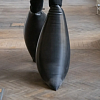 New “dutik” from Rick Owens presented at the show in Paris
Strange bulky shoes are another trend of our troubled times, and it’s impossible to ignore. American designer Rick Owens presented voluminous inflated latex boots at a show in Paris, which, according to him, were created in collaboration with the young London designer Straighteye, who likes to experiment with architectural volumes.
New “dutik” from Rick Owens presented at the show in Paris
Strange bulky shoes are another trend of our troubled times, and it’s impossible to ignore. American designer Rick Owens presented voluminous inflated latex boots at a show in Paris, which, according to him, were created in collaboration with the young London designer Straighteye, who likes to experiment with architectural volumes.
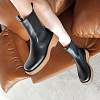 VAGA SHOES is a new participant in the Euro Shoes premiere collection
The Russian women's shoe factory VAGA SHOES will take part for the first time in the international exhibition of footwear and accessories Euro Shoes premiere collection in Moscow.
VAGA SHOES is a new participant in the Euro Shoes premiere collection
The Russian women's shoe factory VAGA SHOES will take part for the first time in the international exhibition of footwear and accessories Euro Shoes premiere collection in Moscow.
 Euro Shoes will start operating on February 19 in Moscow!
The winter session of the international exhibition of footwear and accessories Euro Shoes premiere collection will be held in Moscow at the Expocenter from February 19 to 22. The organizers promise the presence of all the main participants at the exhibition, as well as new names from Europe, Asia and Russia.
Euro Shoes will start operating on February 19 in Moscow!
The winter session of the international exhibition of footwear and accessories Euro Shoes premiere collection will be held in Moscow at the Expocenter from February 19 to 22. The organizers promise the presence of all the main participants at the exhibition, as well as new names from Europe, Asia and Russia.
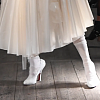 John Galliano and Christian Louboutin created the Tabi collection for Maison Margiela
Maison Margiela creative director John Galliano and French shoe designer Christian Louboutin released a shoe collaboration that was included in the Maison Margiela Artisanal spring 2024 couture collection. The design duo created six versions of the Tabi shoe. All shoe models in the collection have a split toe - a characteristic touch of the signature Tabi shoe model of the Maison Margiela brand. And Christian Louboutin gave the shoe its signature red sole.
John Galliano and Christian Louboutin created the Tabi collection for Maison Margiela
Maison Margiela creative director John Galliano and French shoe designer Christian Louboutin released a shoe collaboration that was included in the Maison Margiela Artisanal spring 2024 couture collection. The design duo created six versions of the Tabi shoe. All shoe models in the collection have a split toe - a characteristic touch of the signature Tabi shoe model of the Maison Margiela brand. And Christian Louboutin gave the shoe its signature red sole.
 Euro Shoes starts in a month in Moscow!
There is less than a month left before the main exhibition of shoes and accessories in Russia - Euro Shoes Premiere Collection. The event will take place from February 19 to 22 in Moscow at the Expocenter, and, as always, in partnership with the largest international clothing exhibition in Russia, CPM Premiere Moscow.
Euro Shoes starts in a month in Moscow!
There is less than a month left before the main exhibition of shoes and accessories in Russia - Euro Shoes Premiere Collection. The event will take place from February 19 to 22 in Moscow at the Expocenter, and, as always, in partnership with the largest international clothing exhibition in Russia, CPM Premiere Moscow.
 Christian Louboutin presented a collection in a cowboy style
At the Loubi Show in Paris, the French luxury brand Christian Louboutin presented its fall 2024 collection, following the trend - in the style of the Wild West. It included cowboy boots and rhinestone loafers.
Christian Louboutin presented a collection in a cowboy style
At the Loubi Show in Paris, the French luxury brand Christian Louboutin presented its fall 2024 collection, following the trend - in the style of the Wild West. It included cowboy boots and rhinestone loafers.
 Camper has released innovative sneakers - designers
Spanish brand Camper's new Roku sneaker features six interchangeable components to create up to 64 different looks and color combinations. Roku means "six" in Japanese.
Camper has released innovative sneakers - designers
Spanish brand Camper's new Roku sneaker features six interchangeable components to create up to 64 different looks and color combinations. Roku means "six" in Japanese.
 Fashion Week takes place in Moscow
Fashion Week takes place in the Russian capital. Events include fashion shows, markets where you can purchase clothes, bags and accessories, and a B2B Showroom for fashion industry professionals.
Fashion Week takes place in Moscow
Fashion Week takes place in the Russian capital. Events include fashion shows, markets where you can purchase clothes, bags and accessories, and a B2B Showroom for fashion industry professionals.
 Why Rendez-Vous and Yandex Lavka released a “bread bag”
Shoe retailer Rendez-Vous announced the launch of a spring collaboration with Yandex Lavka and released a roll that resembles the shape of a woman’s handbag. This “Bread Bag” is presented in the Yandex.Lavka application at a price of 249 rubles. On the product packaging there is a promotional code for 1000 rubles, which can be spent in the Rendez-Vous network.
Why Rendez-Vous and Yandex Lavka released a “bread bag”
Shoe retailer Rendez-Vous announced the launch of a spring collaboration with Yandex Lavka and released a roll that resembles the shape of a woman’s handbag. This “Bread Bag” is presented in the Yandex.Lavka application at a price of 249 rubles. On the product packaging there is a promotional code for 1000 rubles, which can be spent in the Rendez-Vous network.
 Fashion trends Fall-Winter 2023/24 for commercial footwear purchases
Permanent contributor to Shoes Report. Elena Vinogradova, an expert in sales and purchases in the fashion business, prepared an overview of the trends for the autumn-winter 2023/24 season especially for us.
Fashion trends Fall-Winter 2023/24 for commercial footwear purchases
Permanent contributor to Shoes Report. Elena Vinogradova, an expert in sales and purchases in the fashion business, prepared an overview of the trends for the autumn-winter 2023/24 season especially for us.
 MSCHF and Crocs launch "Big Yellow Boots"
Creator of the Big Red Boots, Brooklyn brand MSCHF has teamed up with American plastic clog and sandal brand Crocs for another oversized shoe. The new Big Yellow Boots will go on sale on August 9th.
MSCHF and Crocs launch "Big Yellow Boots"
Creator of the Big Red Boots, Brooklyn brand MSCHF has teamed up with American plastic clog and sandal brand Crocs for another oversized shoe. The new Big Yellow Boots will go on sale on August 9th.
 Five rules of professional lighting for a shoe store - something that is relevant in any season
When developing a lighting concept for shoe retailers, it is important to take into account not only the history of the brand, the architectural content of the premises, the target audience of the stores, but also the seasonality of the goods. With the onset of the cold season, client preferences change: bright weightless shoes are replaced by more massive models in discreet dark colors. Despite significant differences in summer and winter collections, the overall philosophy of the brand, its recognition should remain unchanged at any time of the year. Tatyana Ryzhova, an SR lighting expert in fashion retail, has identified five basic rules for a competent lighting concept for a shoe store for readers of the magazine, which will help to present winter assortment to customers in a winning way.
Five rules of professional lighting for a shoe store - something that is relevant in any season
When developing a lighting concept for shoe retailers, it is important to take into account not only the history of the brand, the architectural content of the premises, the target audience of the stores, but also the seasonality of the goods. With the onset of the cold season, client preferences change: bright weightless shoes are replaced by more massive models in discreet dark colors. Despite significant differences in summer and winter collections, the overall philosophy of the brand, its recognition should remain unchanged at any time of the year. Tatyana Ryzhova, an SR lighting expert in fashion retail, has identified five basic rules for a competent lighting concept for a shoe store for readers of the magazine, which will help to present winter assortment to customers in a winning way.
 Bertsy: what to look for when choosing a model
Bertsy and tactical boots are becoming more and more relevant footwear, and not only because of the start of the hunting season. In Russia, there are several dozen enterprises producing this type of footwear. Oleg Tereshin, Deputy Chief Technologist of ZENDEN, told Shoes Report about the differences and features of ankle boots and what you should pay attention to when buying them in specialized retail and online.
Bertsy: what to look for when choosing a model
Bertsy and tactical boots are becoming more and more relevant footwear, and not only because of the start of the hunting season. In Russia, there are several dozen enterprises producing this type of footwear. Oleg Tereshin, Deputy Chief Technologist of ZENDEN, told Shoes Report about the differences and features of ankle boots and what you should pay attention to when buying them in specialized retail and online.
 EURO SHOES presents an updated section of the GLOBAL SHOES exhibition with collections of shoe and bag brands from Asian countries
EURO SHOES premiere collection is expanding. Along with the traditional pool of leading European footwear brands from Germany, Spain, Italy and Turkey, several dozen footwear and bag brands from the Middle Kingdom will be presented in the GLOBAL SHOES section at the Moscow Expocentre from August 29 to September 1.
EURO SHOES presents an updated section of the GLOBAL SHOES exhibition with collections of shoe and bag brands from Asian countries
EURO SHOES premiere collection is expanding. Along with the traditional pool of leading European footwear brands from Germany, Spain, Italy and Turkey, several dozen footwear and bag brands from the Middle Kingdom will be presented in the GLOBAL SHOES section at the Moscow Expocentre from August 29 to September 1.
 I doubt and object: how to find an approach to difficult clients?
How good and serene would be the work of a salesperson if the customers were calm, cheerful, always knew exactly what they wanted, and bought, bought, bought! It is a pity that this is possible only in dreams. Therefore, we will not dream, but we will act. Together with Maria Gerasimenko, a permanent author of SR, we understand the doubts and objections of buyers and build a strategy for working with them. Our expert pays special attention to the two main objections of buyers, on which 82% of sales are lost.
I doubt and object: how to find an approach to difficult clients?
How good and serene would be the work of a salesperson if the customers were calm, cheerful, always knew exactly what they wanted, and bought, bought, bought! It is a pity that this is possible only in dreams. Therefore, we will not dream, but we will act. Together with Maria Gerasimenko, a permanent author of SR, we understand the doubts and objections of buyers and build a strategy for working with them. Our expert pays special attention to the two main objections of buyers, on which 82% of sales are lost.
 Two prominent Russian fashion designers Vyacheslav Zaitsev and Valentin Yudashkin passed away
One after another, two days apart, Vyacheslav Zaitsev and Valentin Yudashkin, outstanding fashion designers, whose work for the whole world was a kind of hallmark of fashionable Russia, left this world.
Two prominent Russian fashion designers Vyacheslav Zaitsev and Valentin Yudashkin passed away
One after another, two days apart, Vyacheslav Zaitsev and Valentin Yudashkin, outstanding fashion designers, whose work for the whole world was a kind of hallmark of fashionable Russia, left this world.
 World Footwear Yearbook: Global footwear production reaches 23,9 billion pairs and is back to pre-pandemic levels
The Portuguese association of shoe manufacturers APICCAPS published the 13th edition of the international statistical bulletin World Footwear Yearbook for 2023, according to which in 2022 the production and export of shoes worldwide increased by 7,6% and 9%, respectively, and the world production of shoes reached 23,9 billion couples and returned to pre-pandemic levels.
World Footwear Yearbook: Global footwear production reaches 23,9 billion pairs and is back to pre-pandemic levels
The Portuguese association of shoe manufacturers APICCAPS published the 13th edition of the international statistical bulletin World Footwear Yearbook for 2023, according to which in 2022 the production and export of shoes worldwide increased by 7,6% and 9%, respectively, and the world production of shoes reached 23,9 billion couples and returned to pre-pandemic levels.
 Rostov footwear brand Novak presented a collection of sneakers and sneakers
In the spring-summer 2023 season, the Rostov-on-Don shoe brand Novak presented a cute collection of sneakers and sneakers for every day. The upper of the shoe is made of genuine leather, suede, nubuck, the sole is made of light EVA.
Rostov footwear brand Novak presented a collection of sneakers and sneakers
In the spring-summer 2023 season, the Rostov-on-Don shoe brand Novak presented a cute collection of sneakers and sneakers for every day. The upper of the shoe is made of genuine leather, suede, nubuck, the sole is made of light EVA.
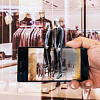 How to create selling visual content for online based on the identified unique selling proposition?
What is a USP (unique selling proposition) and what is it for? Why is the USP creation service in great demand among fashion retailers today? How to create a working USP? Answers questions and provides step-by-step guidance on how to define your unique selling proposition and work with it to increase online sales, Tatyana Vasilyeva, an SR expert in the promotion and development of fashion brands.
How to create selling visual content for online based on the identified unique selling proposition?
What is a USP (unique selling proposition) and what is it for? Why is the USP creation service in great demand among fashion retailers today? How to create a working USP? Answers questions and provides step-by-step guidance on how to define your unique selling proposition and work with it to increase online sales, Tatyana Vasilyeva, an SR expert in the promotion and development of fashion brands.
 Shoe educational program: what shoe soles are made of
“What is the difference between TEP and EVA? What does tunit promise me? Is PVC glue? What is the sole of these shoes made of? ”- the modern buyer wants to know everything. In order not to smash his face in front of him and be able to explain whether such a sole suits him in soles, carefully read this article. In it, process engineer Igor Okorokov tells what materials the soles of shoes are made of and what makes each of them so good.
Shoe educational program: what shoe soles are made of
“What is the difference between TEP and EVA? What does tunit promise me? Is PVC glue? What is the sole of these shoes made of? ”- the modern buyer wants to know everything. In order not to smash his face in front of him and be able to explain whether such a sole suits him in soles, carefully read this article. In it, process engineer Igor Okorokov tells what materials the soles of shoes are made of and what makes each of them so good.
 How to set prices that will earn
Some businessmen still confuse the concept of margin with the concept of trade margins and set prices for their goods, guided solely by the example of competitors. No wonder they go broke! Analyst at the Academy of Retail Technologies Maxim Gorshkov gives several tips and formulas with which you can set not only ruinous, but also profitable prices.
How to set prices that will earn
Some businessmen still confuse the concept of margin with the concept of trade margins and set prices for their goods, guided solely by the example of competitors. No wonder they go broke! Analyst at the Academy of Retail Technologies Maxim Gorshkov gives several tips and formulas with which you can set not only ruinous, but also profitable prices.
 Sales of shoes and accessories: effective techniques for business rhetoric
Which speech modules are effective in communicating with potential and current customers of shoe stores, and which are not, Anna Bocharova, a business consultant, knows.
Sales of shoes and accessories: effective techniques for business rhetoric
Which speech modules are effective in communicating with potential and current customers of shoe stores, and which are not, Anna Bocharova, a business consultant, knows.
 We form the salary of sellers: expert advice
“How do you charge your consultants for personal or general sales?” Is one of the most popular questions causing a lot of controversy and gossip on the online forums of retail business owners. Indeed, how to properly form the earnings of sellers? But what about bonuses, where to get a sales plan from, do employees allow them to buy goods at discounted stores? In search of truth, the Shoes Report turned to a dozen shoe retailers, but no company wanted to disclose its motivation system - the process of its development was too complicated and individual. Then we asked four business consultants, and finally became convinced that the topic of seller motivation is very complex, because even our experts could not come to a common opinion.
We form the salary of sellers: expert advice
“How do you charge your consultants for personal or general sales?” Is one of the most popular questions causing a lot of controversy and gossip on the online forums of retail business owners. Indeed, how to properly form the earnings of sellers? But what about bonuses, where to get a sales plan from, do employees allow them to buy goods at discounted stores? In search of truth, the Shoes Report turned to a dozen shoe retailers, but no company wanted to disclose its motivation system - the process of its development was too complicated and individual. Then we asked four business consultants, and finally became convinced that the topic of seller motivation is very complex, because even our experts could not come to a common opinion.
 The whole truth about Bayer. Who is he and how to become one?
Bayer is no longer a new, but still a popular and sought-after profession. It’s fashionable to be a buyer. Buyers are at the origins of the emergence and development of trends. If the designer offers his vision of fashion in the season, then the buyer selects the most interesting commercial ideas. It is on buyers that the policy of sales of stores and what, in the end, the buyer will wear depends on. This profession is surrounded by a magical fleur, often associated with a lack of understanding of what exactly is the work of a buyer.
The whole truth about Bayer. Who is he and how to become one?
Bayer is no longer a new, but still a popular and sought-after profession. It’s fashionable to be a buyer. Buyers are at the origins of the emergence and development of trends. If the designer offers his vision of fashion in the season, then the buyer selects the most interesting commercial ideas. It is on buyers that the policy of sales of stores and what, in the end, the buyer will wear depends on. This profession is surrounded by a magical fleur, often associated with a lack of understanding of what exactly is the work of a buyer.
 Technology Selling Issues
There is nothing worse than meeting the buyer with the words “Hello, can I help you with something?”, Because the seller works in the store just to help. Criticizing this well-established pattern of communication with the buyer, Andrei Chirkarev, business coach for effective sales and the founder of the New Economy project, shares the technology of truly selling issues with readers of Shoes Report.
Technology Selling Issues
There is nothing worse than meeting the buyer with the words “Hello, can I help you with something?”, Because the seller works in the store just to help. Criticizing this well-established pattern of communication with the buyer, Andrei Chirkarev, business coach for effective sales and the founder of the New Economy project, shares the technology of truly selling issues with readers of Shoes Report.
 Fur, and not only: types of lining
In the production of winter footwear, various materials are used that are designed to retain heat and meet the requirements of consumers: natural sheepleather, artificial fur, artificial fur from natural wool and others. All types of lining fur have their own advantages and disadvantages. Let's consider the properties of each of them.
Fur, and not only: types of lining
In the production of winter footwear, various materials are used that are designed to retain heat and meet the requirements of consumers: natural sheepleather, artificial fur, artificial fur from natural wool and others. All types of lining fur have their own advantages and disadvantages. Let's consider the properties of each of them.
 Retail Arithmetic
Before you begin to solve specific problems, you need to find out how accurately all the leaders of your company understand the basic terminology of retail.
Retail Arithmetic
Before you begin to solve specific problems, you need to find out how accurately all the leaders of your company understand the basic terminology of retail.
 How to fire a worker without tears, scandal and trial
Sooner or later, any manager is faced with the need to part with an employee. Properly and on time the dismissal procedure will save the company money, and the boss himself - nerves and time. But why sometimes, knowing that a break in relations is inevitable, we put off the decision for months?
How to fire a worker without tears, scandal and trial
Sooner or later, any manager is faced with the need to part with an employee. Properly and on time the dismissal procedure will save the company money, and the boss himself - nerves and time. But why sometimes, knowing that a break in relations is inevitable, we put off the decision for months?


